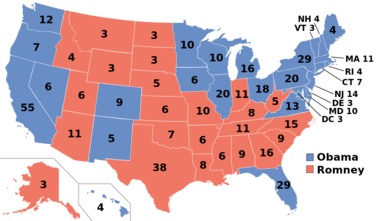GOP ploy to change electoral college bound to backfire

BY COKIE ROBERTS AND STEVEN V. ROBERTS, Guest Columnist
"We must stop being the stupid party," Louisiana Gov. Bobby Jindal warned fellow Republicans recently. "It's time for a new Republican Party that talks like adults."
Many Republicans apparently weren't listening, because they insist on doing stupid things. Exhibit A: lawmakers in a half-dozen states who are trying to alter the Electoral College system to give Republicans more votes.
This is a desperate and ultimately self-defeating reaction to the changing demographics of America. The GOP calculus seems to be: We can never appeal to minorities, and we cannot win the presidency without them, so let's rig the system to reduce their influence -- and, in the process, really tick them off. The result will be to make minorities feel even more unwelcome in the Republican Party than they already do, and more likely to step up their organizing and voting efforts.
In all but two cases, Maine and Nebraska, all of a state's electoral votes go to the winner of the popular vote. Republicans loved this system when they were regularly capturing the White House (five of seven times between 1980 and 2004). But Barack Obama's two victories have scared the heck out of them, and with good reason.
In 1980, the electorate was 88 percent white, and Ronald Reagan won 56 percent of that vote in easily defeating Democrat Jimmy Carter. Last year, Mitt Romney actually bested Reagan among whites, winning 59 percent. But whites accounted for only 72 percent of the total vote, and Obama crushed Romney with minorities, taking 93 percent of blacks, 73 percent of Asians and 71 percent of Hispanics.
These minority voters, often clustered in urban areas, provided key margins for Obama in swing states such as Ohio, Florida and Virginia. So, figured those brilliant GOP strategists, perhaps the law could be changed to allocate electoral votes by congressional district, thus boosting the leverage of rural areas and undercutting that Democratic advantage. If that alternative system had been in effect last fall in Virginia, for example, Romney would have won nine of 13 electoral votes -- even while losing the state by 150,000 popular votes.
From a crass political viewpoint, it might be worth enraging minorities if the GOP ploy had any chance of working. But it doesn't.
Smart Republicans are appalled. "It's not going to happen in Virginia," insisted the state's ambitious Republican governor, Bob McDonnell. State Sen. Jill Holtzman Vogel called the scheme "pretty shortsighted."
Then a state Senate committee controlled by Republicans killed the bill.
Even if these proposals somehow became law, they would immediately be challenged in court as racially biased. And that's exactly what they are. State Sen. Charles Carrico, the lead sponsor in Virginia, candidly explained his motive in The Washington Post: "The last election, constituents were concerned that it didn't matter what they did, that more densely populated areas were going to outvote them."
Most federal judges will surely understand that "densely populated areas" -- along with "urban" and "metro" -- are code words for race. And by the way, Sen. Carrico, that's how democracy works. The majority wins. Blacks in Alabama and gays in Idaho also feel outvoted.
Just because an idea is stupid doesn't make it surprising. Attempts to rig the Electoral College flow from the same motives that inspired Republican lawmakers to pass laws limiting voter participation in a dozen states last fall. Many of the laws were tossed out on legal grounds, but they gave Democrats in "densely populated areas" a pitch-perfect rallying cry.
The Nation quoted Matt Barreto, a pollster specializing in the Latino vote: "There were huge organizing efforts in the black, Hispanic and Asian communities, more than there would have been, as a direct result of the voter suppression efforts." The Rev. Tony Minor, an African-American minister in Ohio, added: "When they went after big mama's voting rights, they made all of us mad."
Sanity has not completely deserted Republican ranks. In Florida, state House Speaker Will Weatherford told reporters that Republicans don't need "to change the rules of the game" and offered a different option: "I think we need to get better." Fellow Floridian Sen. Marco Rubio is doing exactly that, bravely joining a bipartisan group of U.S. senators in proposing a reasonable compromise on immigration reform. Jeb and George Bush have both proved that Republicans can win a decent share of Hispanic support if they respect and understand those voters.
Subverting democracy by suffocating minorities is the opposite of respect. It ignores Jindal's advice and damages the Republican brand. Talk about stupid.
Source: The Express-Star, Chickasaw OK, via the AP.





